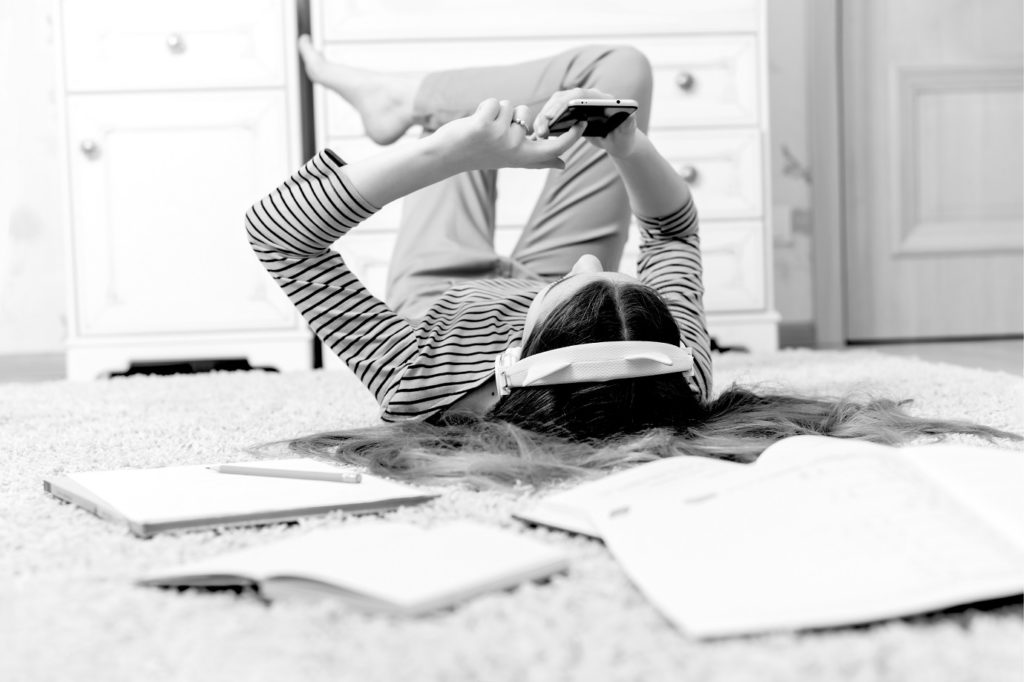In ‘Dear Danni’, Dannielle Miller shares tips on parenting kids aged 10+.
We’re living through the stage 4 restrictions in Melbourne and my 15 year old daughter is finding it particularly tough. She barely leaves her room. She is doing the minimum amount of school work possible. She has stopped practicing the violin and cooking (which she previously enjoyed) and now refuses to even engage in any kind of conversation with me. I’m not even sure now if she’s speaking with her friends. It’s just the two of us at home, and so this is particularly lonely and difficult – and very different to the first lockdown, when we did walks together, played games and actually bonded a little during that time. What can I do to get her talking again?
It sounds like your daughter is grieving. Grief can be loud; it can cry, and wail. Or it may be more silent. It can come in waves too; we may have days when we feel more optimistic, and yet revert back to feeling flat and despairing.
This second lockdown has been more challenging as life had finally felt a little more normal, hadn’t it? To have that taste of normalcy snatched away has hit many of us hard and it has been particularly challenging for our teens.
For adolescents, the face to face interaction they have with their friends at school, and when they join them for extra curricula activities, is a key source of their happiness.
As fun as I am sure you are (walks and board games? Count me in!) nothing will replace the closeness she had with her classmates. Do you remember how intense your friendships were when you were a teen girl? All the giggling, the sharing of secrets. Of course, I love the friends I have now, but the need for their company and acceptance was so very urgent back then. She may also be mourning going to the movies, cafes, to concerts… there is so much to yearn for isn’t there?
As adults, we may have a deeper understanding that this too shall pass. We may have experienced heartbreak and great disappointment before. But, for our teens, this may be their first experience with deep loss.
You need to try to keep the lines of communication open, and try not to get too hurt if she isn’t yet responding.
There are a number of ways in which you can help your daughter become more hopeful. You might encourage her to engage in an act of altruism (giving to others reminds us that no matter how alone we may we think we are, we are still connected and able to make meaningful contributions). You might suggest she has a virtual catch up with a positive friend or family member who you know tends to leave her feeling uplifted. You could talk to her about being discriminating with what she reads, listens to and watches (immersing ourselves in negativity only feeds despair). Perhaps buy her some uplifting books as a surprise (or a new cook book that might inspire her!).
But there’s another tool in the hope toolbox that I think is often overlooked – nostalgia.
Researchers have found that rather than increasing sadness, looking back fondly at things in the past that brought us joy can counteract boredom, isolation and anxious thoughts. The warm feelings reflecting on the past generate can help us feel more optimistic and inspired about the future.
I’ve noted that during this period of great global uncertainty, many of us have instinctively become nostalgic. One of the first things my 21- year-old daughter, Teyah, and I did was rewatch the Twilight series of movies. Teyah wasn’t craving vampires, but rather the warm glow of recalling what it was like to be a passionate teen tossing up between Team Edward or Team Jacob. We both loved giggling together over some of the bad acting, and recalling the exciting hype that surrounded the franchise.
It’s not surprising that over the last few months hashtags like #MeAt20 and #TBT (throw back Thursday) have proved popular online.
If your child is feeling a little hopeless at the moment, grab some popcorn and a blanket and settle in to watch whatever movie was their favourite when they were younger. Get out the old photo albums and look through them together. Play the music they were obsessed with around the house.
Looking back can help shine a light on the way forward.
You also need to take care of yourself. All this reaching out and holding hope can be exhausting! I know it sounds trite, but it really does take a village to raise a child – even if that village is just being used to vent to.
And if you feel that her mood, or indeed your own, is worsening (you notice her appetite or sleep patterns are changing, or you see any signs of self-harm) do seek professional support.
If you or someone you know needs assistance, contact Kids Helpline on 1800 55 1800, Lifeline on 13 11 14, or Beyond Blue on 1300 22 4636.
Check out our introduction to Dear Danni here and find out why we need to ask and answer questions about our teens right now.
Dannielle Miller is the CEO of Australia’s leading provider of in-school wellbeing programs for teens, Enlighten Education. She is also a best-selling parenting author, is employed as the Education Officer for Women’s Community Shelters, and is the founder of The School Toilet Project. In 2018, she was the winner of the Suicide Prevention Australia Life Award, and one of four Finalists for the NSW Premier’s Woman of the Year Award.


